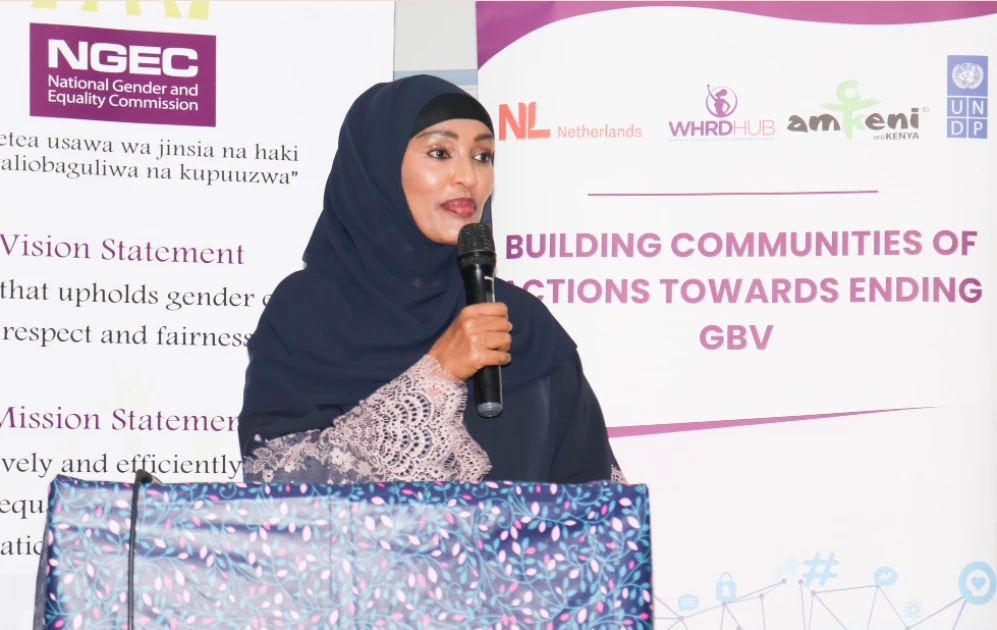Gender Commission calls for exhumation of teen killed in forced marriage saga

The National Gender and Equality Commission (NGEC) is calling for the exhumation of the body of 17-year-old Gaala Aden Abdi, a refugee in Wajir who was killed after resisting a forced marriage to a 55-year-old man.
NGEC Chairperson Rehema Jaldesa said the teenager’s body was hurriedly buried in an attempt to erase evidence of the crime and urged authorities to take urgent action.
Speaking during a Gender-Based Violence (GBV) public participation forum on Friday, Jaldesa recounted her visit to Wajir, where she observed a troubling shift in the community’s account of the incident.
“I went to Wajir, and the first thing I noticed was that the community, including the local chief, quickly shifted the narrative from murder to suicide, which was extremely unfortunate,” she said.
Gaala was reportedly beaten to death by three men—her would-be husband and his two brothers—before they set her body on fire in a bid to stage her death as a suicide.
Jaldesa told the forum, led by GBV Technical Working Group Chairperson Nancy Baraza, that several members of the community witnessed the incident.
“There were so many community members who were present when the girl was beaten by three men, the husband and his two brothers. They hit her, according to the witness, and killed her,” Jaldesa said.
She revealed that efforts were made to fake injuries on the man she had rejected, to suggest she had attacked him.
“To cover up the crime, they set her body on fire and made small cuts on the husband's hand and waist to create the illusion that she had attacked him,” Jaldesa explained.
"The narrative they pushed was that when she saw the man was bleeding, she set herself on fire."
She said no postmortem was done prior to the burial, which risks weakening the case against those responsible.
“Without a postmortem, there is no evidence to prosecute. I am appealing to the Directorate of Criminal Investigations (DCI) to exhume the body so we can determine the cause of death,” she urged.
Jaldesa also raised concern about plans within the community to resolve the case using traditional methods, known as “Masala,” where monetary compensation is paid to the victim’s family.
“Masala is allowed by law, but it is meant for social issues. It cannot apply in cases of murder or Gender-Based Violence,” she emphasized.
Even more disturbing, she said, was that Gaala had made several distress calls before her death, including sending audio recordings of her abuse to her family.
“Her relatives received distress calls, including recordings of the girl being tortured. She even told her mother, 'They are killing me, they are torturing me, this is what they are doing.' Yet, no one came to her rescue, leaving her at the mercy of the perpetrators,” Jaldesa said.
She blamed the cultural practice of treating girls as property for the crime, saying Gaala had no idea that plans had been made to marry her off.
“Some community elders and the husband's relatives sought her hand in marriage. The girl was unaware of the discussions, and she was treated like a commodity. They didn’t even disclose that the man was 55 years old,” Jaldesa said.
Three suspects have since been arrested, but the GBV taskforce wants deeper investigations.
Baraza expressed frustration over the way the case was handled by police, especially the failure to carry out a postmortem.
“That body was quickly buried without a post-mortem. And so that may confuse things when it comes to evidence. But we want to urge the IG and his office to quickly readjust so that a message goes to the police at all levels that matters of GBV and femicide must be responded to in the fastest and most sensitive manner possible,” she said.
Baraza noted that many of the submissions received from Kenyans, civil society groups, and survivors blame the police for failing to treat GBV cases seriously.
“The reports we are getting so far is that the attitude from some of the police, some police do a good job, but some don't think that is an issue that warrants their attention,” she stated.
She said officers across the country must be directed to handle femicide and GBV with the seriousness required.
“So we are urging the IG to communicate to his team at their lowest level that reports on matters of GBV and femicide must be treated with the seriousness that they deserve,” Baraza urged.
She expressed worry about the increasing cases of femicide, most of which involve young women.
“There was another unfortunate case of the girl in Multimedia University, whose body was found in a water tank. You just walk with our body and put it in a tank,” she lamented.
“And you know that is how callous we are treating the lives of young women, girls, and women. It's like the human value of girls and women is gone. We saw another one who walked with body parts dripping.”
Baraza said the taskforce intends to ask for an extension of its mandate, which is set to expire on April 9, so that they can continue gathering more views from across the country.
“We have received a lot of memoranda from the public. We have also done a lot of desk review of the many, many documents that have come from the government, from the NGO sector, from other participants,” she said.
She added that they still needed to collect views from counties, which is part of their constitutional mandate.
“What remains now is just to go to the counties, which is a constitutional mandate. And therefore we are hoping that we will put in our progress report to the appointing authority to justify a request for probably one month because we can't leave out those Kenyans,” Baraza said.
